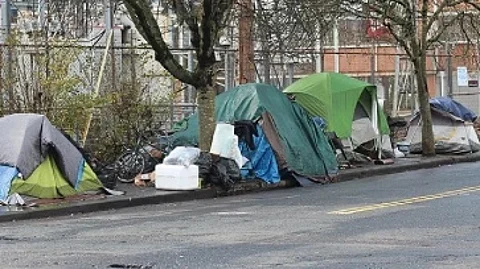

My son, whom I love, has been homeless most of his adult life, struggling with substance use and poor mental health.
He repeatedly refused help and became aggressive at times. It started with cannabis and then spiralled out of control. He drifted between homeless shelters, eventually ending up at the Calgary Drop-In Centre (DI) — a challenging and sometimes dangerous place, serving vulnerable adults experiencing homelessness.
One of the saddest moments of my life was taking him out for lunch one day in winter. His knuckle was skinned, and he wore discarded clothing. He was erratic and stole a bottle of beer from the restaurant.
I didn’t handle it well — a parenting failure. Embarrassed, I chastised him and walked away. I didn’t see him again for months.
It feels like yesterday when I baptized my son, now 24, in a mountain lake with help from a local church in the Slocan Valley of B.C. He was 10. Everything was going to be OK. It feels like yesterday when he was a smiling, laughing toddler.
My grief lives at the intersection of good memories and hopelessness.
I reported him missing to the Calgary Police Service several times. All they could tell me, due to confidentiality, was that he was alive. Not knowing his condition felt worse than death.
About eight weeks ago, through a kind friend with connections, I intercepted my son in a courtroom in Diamond Valley. He had committed some crimes there — at one point sleeping under a tarp.
I spoke with his legal aid lawyer and the judge. Seeing him behind plexiglass, flanked by sheriffs, tore at my heart. Hours later, he was discharged from custody into my care. A miracle. Thirty days house arrest and probation.
Thankfully, he’s improving, and I hope he’ll make a recovery.
For now, most of the sadness is gone. We eat together, pray together, go for drives in the country and listen to music. The other night, I gave him a personal house concert — playing songs on my guitar as the sun beamed through the window.
There are many "I love you's." I'm proud of him for surviving. I've asked for forgiveness.
My situation isn’t perfectly applicable, but it relates to the Compassionate Intervention Act announced by the province on Tuesday. The act, introduced by Alberta’s Minister of Mental Health and Addiction Dan Williams, aims to reform a broken system that allows addicts to deteriorate on the street — a departure from harm reduction models promoted by well-meaning activists in provinces like British Columbia.
Under the legislation — if passed — family members, health-care professionals, or police can request a treatment order for those with severe addiction, offering a chance for healing and recovery off the streets.
The act comes amid Alberta’s ongoing drug problem. It aligns with the province’s recovery-focused Alberta Recovery Model, which has funded many treatment spaces.
Budget 2025 allocates $180 million over three years to build two 150-bed compassionate intervention centres in Edmonton and Calgary, with construction starting in 2026.
Tens of thousands of Canadians have died due to the drug crisis — a toll critics say has been worsened by the liberalization of drug policy, such as B.C.’s decriminalization and safer supply programs, which have seen thousands of overdose deaths.
Many parents are in far worse situations than I am. Thanks to Williams for having the courage to chart a new course for drug treatment in Alberta, and to Premier Danielle Smith for backing him.
The plan isn't perfect, but it's a significant step.
Hopefully, fewer families will suffer in the future. Hopefully love will prevail over darkness — no politician can make that happen.
